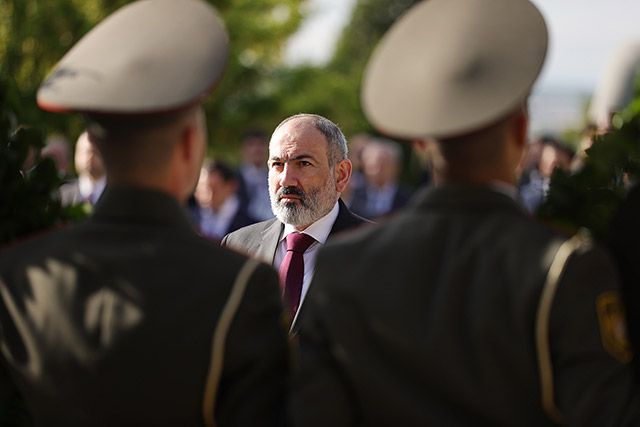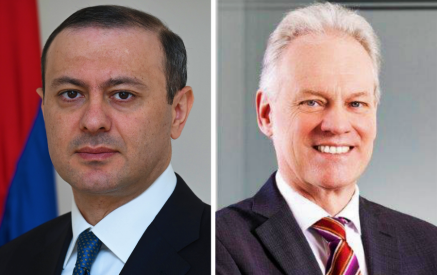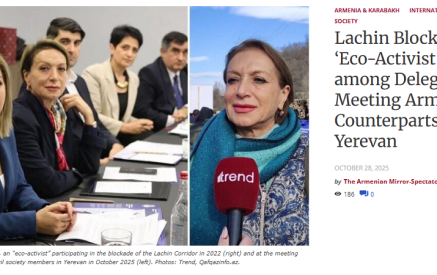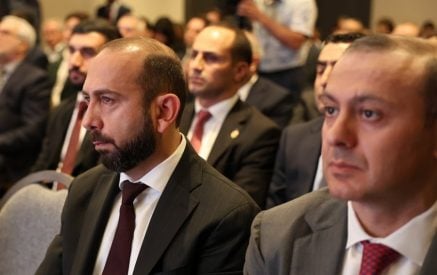Publication: Eurasia Daily Monitor Volume: 19 Issue: 69
By: Armen Grigoryan
Last month (April), European Union officials stepped up their efforts to mediate a political settlement between Armenia and Azerbaijan, while the two governments agreed to establish a bilateral commission on border demarcation and security (Azatutyun.am, April 7; see EDM, April 14). These developments raised anticipation in the region that a peace deal between Armenia and Azerbaijan could be under way, despite a sharp rise in tensions in Karabakh earlier that spring (BBC News—Russian service, March 26; see EDM, March 29). More recently, on May 2, United States Secretary of State Antony J. Blinken hosted Armenian Foreign Minister Ararat Mirzoian, in Washington, to relaunch the US-Armenia Strategic Dialogue (Civilnet, May 3). The secretary of the Security Council of Armenia, Armen Grigorian, has also been engaging in intensive international contacts over the past few months, inter alia traveling to Berlin, Brussels, Vilnius and Tbilisi (Radio Armenia, March 18; ARKA, March 29; 1lurer.am, May 3). Back home, however, resistance to these trends in Armenian foreign policy has fueled political protests.
The recent diplomatic efforts may be viewed as a part of the Armenian government’s cautious attempts to balance the country’s foreign policy away from regional isolation and an overreliance on Russia. But rather predictably, these policies triggered the parliamentary opposition, which in the recent months has been advocating ever more strongly for joining the Russia-Belarus Union State (see EDM, March 24). The two main opposition factions—“Armenia,” presided over by former minister of defense Seyran Ohanian but de facto led by former president Robert Kocharian (in office 1998–2008), and “I Have Honor,” chaired by former National Security Service director Arthur Vanetsian but de facto headed by former president Serzh Sargsian (in office 2008–2018)—renewed their attempts to oust Prime Minister Nikol Pashinian by launching mass street demonstrations in the last week of April. The protest activities, involving the two previous presidents themselves, their relatives, and many former officials, have been ironically labeled “millionaires’ protests” (1in.am, May 2).
Many of the former officials associated with this opposition campaign are under investigation for illicit enrichment. These legal processes likely provide at least some motivation for the efforts to topple Pashinian, even though the corruption investigations have been delayed by the government’s overly cautious approach to the reform of the judiciary and the law enforcement agencies. Moreover, some of these political figures also will find it difficult to seek refuge abroad: for example, the US Justice Department is currently seeking forfeiture of a mansion listed for $63,500,000, which was allegedly acquired with the proceeds of a corruption scheme by Gagik Khachatryan, who served as the chairperson of the Armenia State Revenue Committee and as minister of finance of from 2008 to 2016 (Justice.gov, May 5).
Read also
In any case, the Armenian opposition is alleging that the “pro-Turkish [sic] government [of Prime Minister Pashinian] is about to sell Karabakh,” and it declares that it will use the same tactics of peaceful protests that originally brought Pashinian to power in 2018 (see EDM, April 23, 2018). The initial street actions, mimicking the 2018 “Velvet Revolution” protest movement, included a group led by a member of the “Armenia” faction marching from Pashinian’s home town of Ijevan to Yerevan as well as blocking traffic at some intersections of the capital. Unlike four years ago, however, these latest rallies only involved small groups of people and ended quickly. Meanwhile, affiliated structures in the diaspora—primarily local branches of the Armenian Revolutionary Federation (Dashnaktsutyun)—have been harassing Armenian diplomats abroad, including Minister Mirzoian (Armeniasputnik.am, May 3), as well as diplomatic and consular representations (Arfd.am, May 8). Opposition rallies in the evenings have been gathering a few thousand participants, although their media outlets exaggerate the scope of the events. Characteristically, Sputnik Armenia and Russian pro-government media have been openly supportive of the protests. In general, as noted by several local observers as well as Russian journalists critical of the Vladimir Putin regime, the protesters’ general disposition is pro-Russian, including support for the Russian war of aggression in Ukraine (Novaya Gazeta, May 5).
Popular support for the opposition has not been significant so far. Attempts to organize a student strike failed, and most recent weekend rallies in Armenia’s second- and third-largest cities (Gyumri and Vanadzor, respectively) saw few participants. Meanwhile, the police is investigating whether the opposition leadership paid some citizens for take part in the protests (Factor.am, May 9).
The anti-Pashinian faction apparently lacks a positive agenda. Characteristically, its leaders do not present a program, nor do they explain how they would “save” the country. The opposition’s appeal to the public has been overwhelmingly dependent on “patriotic” rhetoric and emotional outbursts. Its leaders’ backgrounds are likely an even stronger reason for the lack of public support—Armenian society has, by and large, not forgotten the decades of corruption and political oppression under the previous regime. Yet that limited popularity may, in turn, be contributing to the opposition’s radicalization. On the level of rhetoric, the usual invectives against the government and allegations that it is backed by George Soros, the LGBT lobby and other “anti-national” forces, are increasingly supplemented by hate speech as well as foul and divisive language against citizens unsupportive of the opposition in general, remarks that they are not true Armenians, with “impure blood” and so forth (Hayeli.am, May 9). Some elderly citizens critical of the former officials were beaten by a group of opposition activists in Gyumri (Armenpress.am, May 9).
The government’s tactics are likely to wait until the current protests fizzle out. Stricter measures may so far be considered unnecessary to restore order, unless opposition radicals attempt to seize public buildings or resort to more violent actions. However, strong political polarization and increasingly disruptive “civil disobedience” activities by the opposition may gradually succeed in limiting or distracting the state’s effective decision-making capacity—particularly as it attempts to diversify Armenian foreign policy.






















































